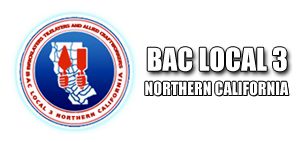NEWS ARTICLE – November 9, 2015
From the Desk of Steve:
To BAC Membership;
With continued work, more projects are being negotiated and covered by PLA’s (Project Labor Agreements) and PSA’s (Project Stabilization Agreements); all union projects or all union wages and conditions.
Speaking to our membership out in the field, some have asked me what is Prevailing Wage and what is a Public Works project? In construction, the prevailing wage is posted twice a year by the State Department of Industrial Relations (DIR) based on each unions wage and benefits package, and working conditions contained in their Collective Bargaining Agreements (CBA).
On a Prevailing Wage project, if the Contractor is not signatory to a Union, they must pay non-union workers the entire wage package (wages and benefits per hour) on the check, per that trades DIR/CBA determination.
Here is more Insight on Prevailing Wage.
What is Prevailing Wage?
California’s prevailing wage law was enacted more than 50 years ago, by Governor Goodwin Knight. It’s known as the Little Davis-Bacon Act. The original federal Davis-Bacon Act was passed in 1931.
Prevailing wage laws, both federal and state, were enacted for two reasons. The first was to ensure that skilled construction workers employed on public works projects would be paid at least the wages and benefits that “prevail” in their local communities. The second reason was to make sure that unscrupulous contractors would not import unskilled or low skilled workers from other parts of the country who would undercut the local workforce by working for lower pay.
The maintenance of the prevailing wage has resulted in the preservation of a highly skilled workforce in the construction industry. Comprehensive and demanding apprenticeship programs, made possible by a stable wage, have been set up by the construction unions. The graduates of those programs are highly trained workers who are fast, efficient, and safe.
In recent years, some states have abolished the prevailing wage, and are now experiencing negative results. A study performed at the University of Utah revealed that in those states there was a tripling of cost overruns on public projects, a 15 percent increase in construction injuries, and a 40 percent decline in apprenticeship training. All of this to save an estimated 1.7 percent in state construction costs.
Governor Pete Wilson tried to take California down that same road, but organized labor fought back, and won.
On June 1, 1999, Governor Gray Davis signed SB 16, authored by Senate President pro Tempore John Burton and Assembly Speaker Antonio Villaraigosa, protecting California’s prevailing wage law.
Public works
Public works (or internal improvements historically in the United States) are a broad category of infrastructure projects, financed and constructed by the government, for recreational, employment, and health and safety uses in the greater community. They include public buildings (municipal buildings, schools, hospitals), transport infrastructure (roads, railroads, bridges, pipelines, canals, ports, airports), public spaces (public squares, parks, beaches), public services (water supply, sewage, electrical grid, dams), and other, usually long-term, physical assets and facilities.
Municipal infrastructure, urban infrastructure, and rural development usually represent the same concept but imply either large cities or developing nations’ concerns respectively. The terms public infrastructure or critical infrastructure are at times used interchangeably. However, critical infrastructure includes public works (dams, waste water systems, bridges, etc.) as well as facilities like hospitals, banks, and telecommunications systems and views them from a national security viewpoint and the impact on the community that the loss of such facilities would entail. Furthermore, the term public works has recently been expanded to include digital public infrastructure projects. The first (US) nationwide digital public works project is an effort to create an open source software platform for e-voting.
Reflecting increased concern with sustainability, urban ecology and quality of life, efforts to move towards sustainable municipal infrastructure are common in developed nations, especially in European Union and Canada.
The City of San Francisco has the Office of Labor Standards Enforcement (SFOLSE); there are Compliance Officers who follow up on issues and complaints on Prevailing Wage projects in regards to DIR/Union CBA’s standards required on such projects. Non-union as well as union Contractors can be asked to present Certified Payroll on said projects.
I hope this information will enlighten some of you. Best Regards Steven Kantoniemi, BAC LOCAL # 3 Vice Chair.
Feel free to call me in regards to work issues and up and coming Projects # 510-508-1487.
